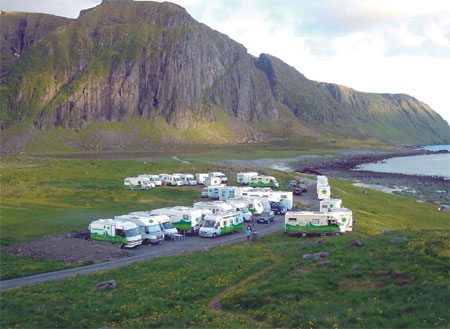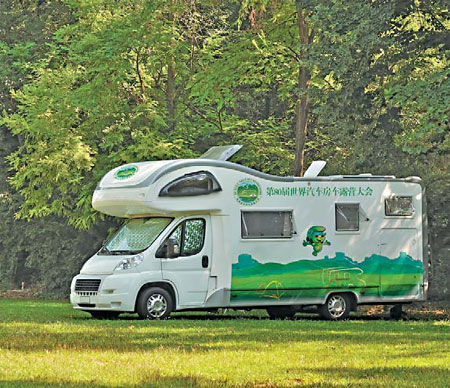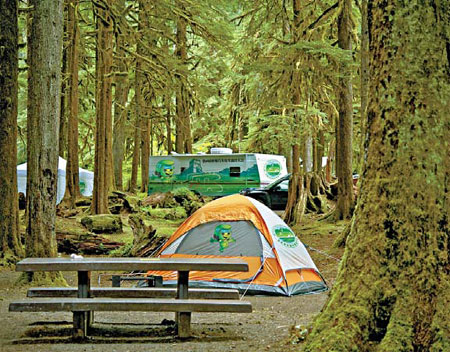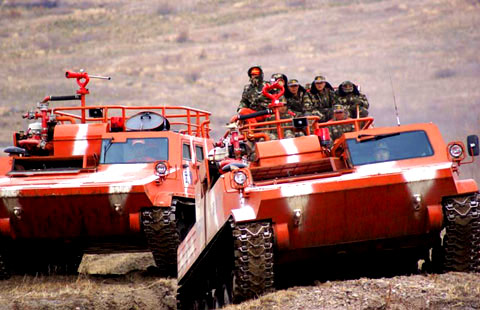RV enthusiasts at home on wheels
Updated: 2014-04-07 07:42
By Zheng Xin (China Daily)
|
|||||||||||
Increasing numbers of Chinese are traveling wherever the road leads. Zheng Xin in Beijing reports.
With growing demand for recreational vehicles in China and consumers' shifting travel preferences, experts expect a surge in RV-related business across the country.
"More people are choosing to explore the countryside and hit the roads with recreational vehicles - a home on wheels," said Li Xiang, a professor of tourism at Beijing Union University. "The idea of packing bags and heading out for wherever the road leads is the latest trend among many outdoor enthusiasts."
Beijing has seen campsites for RV enthusiasts popping up on its outskirts in recent years, including in suburbs like Fangshan, Huairou, Changping, Yanqing and Tongzhou, Li said.
According to the Beijing Tourism Development Committee, the suburbs are competing to become Beijing's leading RV-friendly places.
Xu Jielin, a resident in Beijing, said he has always wanted to have a family vacation in a recreational vehicle, but the cost and maintenance of a mobile home has held him back.
"Compared with purchasing a mobile home or trailer, it's easier to rent an RV at a suburban campsite in Beijing," Xu said.
Xu has registered for the 80th International Federation of Camping club's massive caravanning rally, which is to be held in Beijing starting May 30. The club has been around since 1932, but this will be its first rally in China.
"I'd love to gain some experience on some short trips before hitting the road for longer journeys," he said.
Li said the upcoming rally will give a big boost to the country's RV industry.
"It's the first time the rally has come to China, and it will bring this kind of travel closer to the public," she said. "Many Western RV manufacturers are already targeting the Chinese market."
According to Li, a shortage of RV campsites in China once held back development of this brand of recreation.
"Compared to Europe, which has tens of thousands of RV campsites, China is still in its infancy," she said. "Cities nationwide have been coming up with more campsites in recent years, but few of them are close to each other, which has made it difficult for RV enthusiasts to refill water, recharge electricity and hygienically deal with the waste and sanitation."
The lack of RV campsites has made it difficult for the mobile homes to go wherever the road takes them, which explains why a growing number of RVs can be found at the campsites, but very few are actually seen on the road, Li said.
Li suggested that the government come up with a series of campsites in city clusters - for example to set up several campsites in the Beijing-Tianjin-Hebei region, so that residents of all three areas can hit the road in their mobile home during vacation, without worrying about being stranded without electrical power or water, or having nowhere to dispose of waste.
Gas stations along the highways could add facilities to serve the need, she said.
As the public gets familiar with this mode of travel, more people will be drawn to it, she said.
"Once you try traveling in an RV once, you get hooked. It's nothing like the experience you get in a sedan."
According to Weng Baiji, head of the Taiwan Recreational Vehicle Association, the potential for the Chinese RV camping market is immense.
"The future of China's recreational vehicle industry is bright, and no one wants to miss out on a slice of the cake," he said.
Weng started an RV camping business year ago in Taiwan and it's time to shift attention to the mainland.
Despite the growing number of campsites across the country in the past few years, many fall short when it comes to services and activities, he said.
"For example, many campsites are poorly equipped with showers or medical services," Weng said. "Our RV campsites in Taiwan always provided activities such as international student exchanges, pet walks and exhibitions, and all the various activities that enhance the camping experience. These are barely seen on the mainland."
In Japan, RV campsites are usually combined with nearby entertainment facilities such as mineral springs, fishing sites, museums and fairs, he said.
Weng suggested that Beijing should come up with several RV campsites with different themes on the outskirts of the city.
"The campsites don't have to be large in size, but each should feature in a different theme so that residents can drive to whichever they like best over the weekend," he said.
According to Li, the tourism professor, most RV enthusiasts, or potential ones, are in their 40s or 50s and are adventurous enough to participate while having enough capital to support their pastime.
"Many of these people look at the RV as a way of facilitating communication between family members," she said.
Contact the writer at zhengxin@chinadaily.com.cn
|
RVs share a camping venue in Huairou district, Beijing, in March. A major international rally comes to China for the first time this summer, from May 30 to June 8. Photos by Jin Ying / for China Daily |
|
An RV driver jockeys his rig into a shady parking place at a campsite. |
|
Recreational vehicles intermingle with tents, tables and barbecues. |
(China Daily 04/07/2014 page7)
Today's Top News
Australia also detects suspicious pulse signal
Afghans vote amid Taliban scare
Hostages taken to Philippine island
Huawei and China Daily inks co-op
Pulse signal discovered
in MH370 hunt area
Challenges in search for MH370 'unprecedented'
China urges rescue of abductee
Satellite to monitor disasters in Europe
Hot Topics
Lunar probe , China growth forecasts, Emission rules get tougher, China seen through 'colored lens', International board,
Editor's Picks

|

|

|
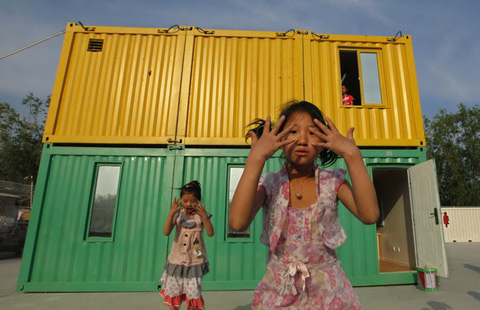
|

|

|
